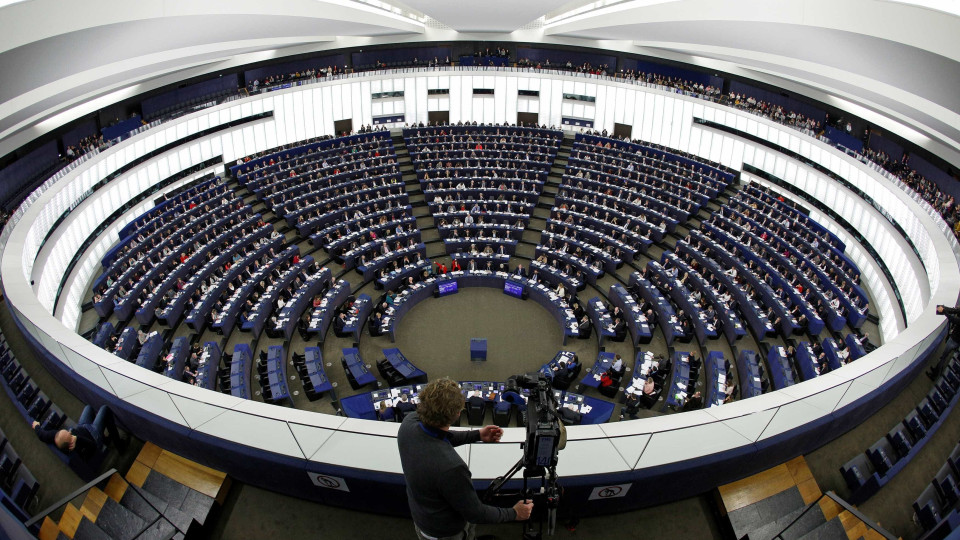European Parliament fulfilled the essential part of the agenda, even with crises
The European Parliament celebrated this week in Strasbourg the last plenary session of the 9th legislature, marked by two unprecedented crises, the covid-19 pandemic and the war in Ukraine, which did not compromise the essential part of the agenda set out in 2019.

© Reuters

Mundo Parlamento Europeu
Despite the crises, one of which is still ongoing, which have concentrated a large part of the European Union's (EU) energies at the level of the three institutions, the general understanding in the European Parliament is that the assembly "complied", with the adoption of "transformative" legislative packages for Europe, according to several parliamentary and party sources.
Among the most emblematic legislative pieces adopted in this legislature (2019-2024), are the large-scale legislative package known as the Green Deal, the reform of the Common Agricultural Policy (CAP), regulation of digital services and markets, including the first EU regulation on artificial intelligence, laws such as those to ensure equal pay, to combat online child sexual abuse and violence against women, and, very recently, the new Migration Pact and the revision of the EU's budgetary rules.
On the negative side, this 9th legislature was also overshadowed by the corruption case known as 'Qatargate', among others involving suspicions of bribes from third-party actors or countries to MEPs, and, through no 'fault' of Parliament, the blocking of laws that had been politically agreed between the institutions and even approved by the assembly, such as the Nature Restoration Law, part of the Green Deal.
In a legislature that also witnessed the unprecedented 'desertion' of an EU Member State -- the United Kingdom's exit, consummated in 2020, which also led to a reconfiguration of the hemicycle due to the departure of the 73 British MEPs -- Parliament managed to be aligned with the institutions in responding to the major challenges of the last five years, with emphasis on the management of the covid-19 pandemic and the response to its consequences, including the large economic recovery plan, as well as support for Ukraine.
However, the next legislative cycle 2024-2029 threatens to be, internally, much more turbulent, given the rise of the radical right anticipated by the polls in many Member States, predicting a much more fragmented European Parliament and a strong presence in the hemicycle of extremist forces, opposed to the major 'flags' of this legislature, such as support for Ukraine and the fight against climate change.
The last day of parliamentary work before the European elections, on Thursday, coincided with the 50th anniversary of April 25, with Portuguese MEPs distributing more than a thousand carnations at the entrance to the Strasbourg hemicycle and singing "Grândola Vila Morena", to recall the values of the revolution and warn of the risks of setbacks, in the face of the advance of the radical right throughout Europe, just over a month before European citizens are called to the polls in the 27 Member States to elect the assembly for the period 2024-2029.
In her last speech as President of the European Parliament in this legislature, Roberta Metsola said she was "immensely proud of all the work done, all the laws passed, all the debates held and all the challenges overcome together", saying she believed that the assembly could "look back on this mandate with satisfaction".
She also stressed the happy coincidence that it ended with the celebration of the 50th anniversary of April 25, "a moment in European history that still reverberates and inspires today" and which, she stressed, reminds us that "we should never take for granted the fundamental European values" that the Carnation Revolution represents: democracy, freedom and dignity.
Although Strasbourg hosted the last legislative session of the legislature, it only ends on July 15, so MEPs will remain in office until then, and may still meet extraordinarily, at the level of parliamentary committees or even plenary, if necessary, explained a spokesperson for the assembly.
However, the European Parliament will only hold a plenary session again in about three months, between July 16 and 19, in what will be the constituent session of the 2024-2029 legislature, already taking into account the results of the European elections scheduled for the period between June 06 and 09 in the 27 Member States.
Read Also: EU. New rules on airline passenger data recording approved (Portuguese version)

Descarregue a nossa App gratuita.
Oitavo ano consecutivo Escolha do Consumidor para Imprensa Online e eleito o produto do ano 2024.
* Estudo da e Netsonda, nov. e dez. 2023 produtodoano- pt.com






